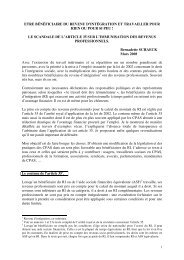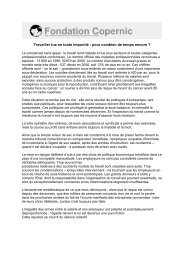Awra Amba RJ 300612 EN - Contacter un comité local d'Attac
Awra Amba RJ 300612 EN - Contacter un comité local d'Attac
Awra Amba RJ 300612 EN - Contacter un comité local d'Attac
You also want an ePaper? Increase the reach of your titles
YUMPU automatically turns print PDFs into web optimized ePapers that Google loves.
6. External relations<br />
Picture 18: Zumra teaching Ethiopian visitors (April 2010).<br />
Today the village is credited with being "an extraordinary initiative within a traditional and<br />
conservative society", "with triggering amazing change in the Amhara region", and as being "a good<br />
example for other Ethiopian comm<strong>un</strong>ities – and even beyond Ethiopia – because of its gender<br />
equality, its work ethic, and its social security system" (Halpern, 2007).<br />
Thus the Amhara Regional Office of Women's Affairs brings <strong>Awra</strong> <strong>Amba</strong> members to other<br />
comm<strong>un</strong>ities of the region in support of its plan for gender equality. "To ask inhabitants of <strong>Awra</strong><br />
<strong>Amba</strong> to talk about their lives has proved to be far more efficient than awareness-raising campaigns<br />
of the office aiming at changing attitudes of other comm<strong>un</strong>ities in terms of share of work between<br />
sexes", said Zelalem, public relations office manager (IPS, 2010).<br />
Moreover, relations are far to be excellent with all authorities. Thus, some development experts at<br />
<strong>local</strong> or regional level do not <strong>un</strong>derstand why inhabitants of <strong>Awra</strong> <strong>Amba</strong> refuse to participate in<br />
certain programmes – whose some rules conflict with their values, and regard this refusal on a totally<br />
wrong manner (At05/56). <strong>Awra</strong> <strong>Amba</strong> r<strong>un</strong>s therefore co<strong>un</strong>ter not only to values and behaviours of<br />
neighbouring peasant comm<strong>un</strong>ities, but also to some ‘modern’ rules of Ethiopian authorities. The<br />
lack of religion and the criticism of religions, which practises <strong>Awra</strong> <strong>Amba</strong>, seem also difficult to<br />
accept in Ethiopia. Thus Yirga (2007/91) thinks "the ways they treat religion and religious related<br />
issues [is] <strong>un</strong>pleasant".<br />
The comm<strong>un</strong>ity has long hoped to fo<strong>un</strong>d brother comm<strong>un</strong>ities elsewhere, but this has been possible<br />
apparently only recently. Prominent representatives of Awi – a greater rural comm<strong>un</strong>ity in northwest<br />
Ethiopia – visited <strong>Awra</strong> <strong>Amba</strong> in 2007 and since should have created a replica of this ideal society.<br />
Awi comm<strong>un</strong>ity seems to be located in the administrative zone of Agew Awi if the Amhara region,<br />
about a h<strong>un</strong>dred kilometres southwest of Bahar Dar (see Figure 6 page 27). On their own initiative,<br />
Awi inhabitants respect the same values, including work, and are now reaping the benefits (IPS,<br />
2010). But this news important for <strong>Awra</strong> <strong>Amba</strong> is not yet confirmed (Question 39 in Annex).<br />
Comm<strong>un</strong>ity members try to promote their values and their experiences, but seem not very receptive<br />
to others, although Zumra affirms his comm<strong>un</strong>ity is open to positive external experiences but ignores<br />
the negative ones: they do not try to share experiences of their numerous visitors (Yi07/69-70) and<br />
children are reluctant in learning other cultures (Yi07/92). A parallel may be drawn between this<br />
behaviour and their lack of interest for literature and social and human sciences (see section 5.1).<br />
73 / 85

















